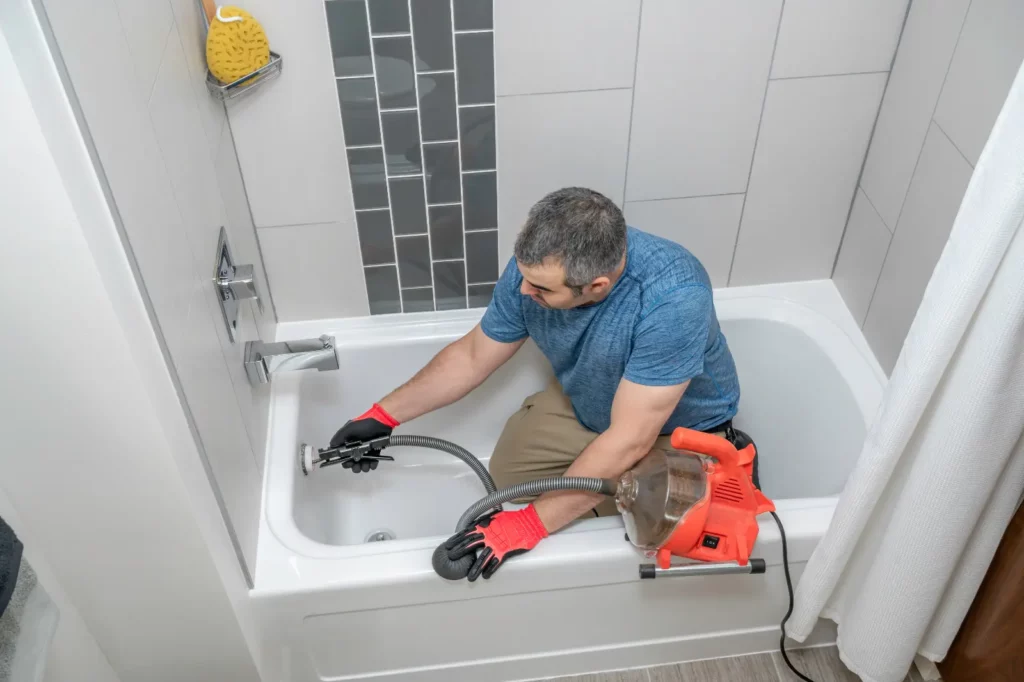Have you ever wondered why, despite your best efforts, drains seem to clog at the most inconvenient times? It’s a frustrating reality that many of us face, but understanding the causes behind these clogs can help you prevent them in the future.
From simple everyday habits to more complex issues, there are various factors that contribute to drain blockages. So, if you’re tired of dealing with clogged drains and want to maintain a smoothly flowing plumbing system, keep on reading to discover the effective prevention strategies that can save you time, money, and headaches.
Key Takeaways
- Debris and hair accumulation over time is a common cause of drain clogs, so using drain catchers or strainers can help prevent this.
- Avoid pouring grease or oil down the drain, as they can solidify and cause clogs.
- Regular DIY drain cleaning using baking soda and vinegar can help maintain clear drains.
- Proper disposal practices, such as composting food waste and avoiding flushing non-flushable items, can also prevent drain clogs.
Common Causes of Drain Clogs
One of the most common causes of drain clogs is simply allowing debris and hair to accumulate over time. It’s easy to overlook the little things that go down the drain, but over time, these small particles can build up and create a big problem. To prevent drain clogs, it’s important to take preventive measures and practice DIY drain cleaning regularly.
To start with, be mindful of what goes down the drain. Avoid letting hair, food scraps, and other debris go down the drain by using drain catchers or strainers. These inexpensive tools can help trap larger particles, preventing them from causing clogs. Additionally, avoid pouring grease or oil down the drain, as they can solidify and create blockages.
Regularly cleaning your drains is another effective preventive measure. A simple DIY drain cleaning method involves using a mixture of baking soda and vinegar. Pour half a cup of baking soda down the drain, followed by half a cup of vinegar. Let the mixture sit for about 30 minutes, then flush it with hot water. This natural solution can help break down any accumulated debris and keep your drains flowing smoothly.
In addition to regular cleaning, consider using a drain snake or auger. These tools can help remove deeper clogs that may be out of reach for simple cleaning methods. By being proactive and implementing these preventive measures, you can reduce the chances of encountering stubborn drain clogs and keep your drains clear and functioning properly.
Proper Disposal Practices for Preventing Clogs
To ensure you prevent clogs in your drains, it is crucial to adopt proper disposal practices. By practicing responsible waste management and environmentally friendly disposal techniques, you can help maintain the cleanliness and functionality of your drains. Here are some guidelines to follow:
| Proper Disposal Practices | Benefits |
|---|---|
| Dispose of food waste in a compost bin or green waste bin | Reduces the risk of clogs caused by food particles |
| Avoid pouring grease and oil down the drain | Prevents the accumulation of greasy substances that can block pipes |
| Use drain strainers or screens to catch hair and large debris | Helps prevent hair clogs and other blockages |
| Dispose of hazardous materials at designated facilities | Protects the environment and prevents damage to plumbing systems |
| Avoid flushing non-flushable items down the toilet | Prevents toilet clogs and avoids potential sewer backups |
Regular Drain Maintenance Tips
Taking proactive measures to maintain your drains can help prevent clogs and ensure the smooth functioning of your plumbing system. By following some eco-friendly drain cleaning methods and implementing DIY drain maintenance hacks, you can keep your drains clear and avoid costly repairs.
One eco-friendly method to clean your drains is by using a mixture of vinegar and baking soda. Start by pouring boiling water down the drain to loosen any debris. Then, pour half a cup of baking soda, followed by one cup of vinegar. Allow the mixture to sit for about 15 minutes, and then flush the drain with hot water. This natural solution helps break down grease and residue, keeping your drains clean and odor-free.
Another effective eco-friendly method is using a drain snake or a bent wire hanger to remove any hair or debris that may be clogging your drains. Simply insert the snake or hanger into the drain and gently push and pull to dislodge the blockage. Remember to dispose of the removed debris properly to avoid further clogs.
In addition to these eco-friendly methods, there are also some DIY drain maintenance hacks that can help keep your drains clear. Regularly pouring boiling water down your drains can help dissolve any buildup and prevent clogs. Using a mesh strainer in your sink and shower drains can also catch hair and other debris before it enters the pipes.
The Importance of Using Drain Screens
Using drain screens is an essential step in preventing clogs and maintaining the efficiency of your plumbing system. These screens act as a protective barrier, catching debris and preventing it from entering your drains. By doing so, they not only prevent clogs but also help to prolong the lifespan of your plumbing system.
One of the benefits of using drain screens is that they’re highly effective at catching different types of debris. Whether it’s hair, food particles, or small objects, drain screens can trap them before they have a chance to go down the drain and cause a blockage. This not only saves you from the hassle of dealing with clogs but also prevents potential damage to your pipes.
There are various types of drain screens available in the market. Mesh drain screens are the most common and are easily installed over the drain opening. They’ve small holes that allow water to flow freely while capturing debris. Another type is the pop-up drain screen, which is designed to close when water isn’t flowing and open when water needs to drain. This type of drain screen is particularly useful in preventing clogs in bathroom sinks and showers.
Using drain screens is a simple yet effective way to prevent clogs and maintain the efficiency of your plumbing system. By investing in the right type of drain screen for each drain in your home, you can ensure that debris is caught before it causes any issues.
Professional Drain Cleaning Solutions
Consider hiring a professional drain cleaning service to ensure the optimal performance of your plumbing system. While DIY drain cleaning methods can be effective, they may not always provide a long-term solution. Professional drain cleaners have the expertise and tools to thoroughly clean your drains, removing stubborn clogs and preventing future blockages.
Chemical drain cleaners are commonly used by professionals to dissolve and break down clogs. These powerful solutions contain chemicals that can effectively clear blockages caused by hair, grease, and other debris. However, it’s important to note that chemical drain cleaners should be used with caution and only as directed. Improper use may damage your pipes or harm the environment.
In addition to chemical drain cleaners, professional drain cleaning services may also utilize other methods to unclog your drains. These can include:
- Hydro jetting: This method involves using high-pressure water to flush out blockages and clean the inside of your pipes. It’s particularly effective for removing stubborn clogs and buildup.
- Drain snaking: A drain snake, also known as an auger, is a flexible tool that can be inserted into your drains to break up and remove blockages. It’s especially useful for clearing clogs caused by solid objects.
Summary
So, remember to be mindful of what goes down your drains and practice proper disposal habits to prevent clogs.
Regular maintenance and the use of drain screens can also help keep your drains clear.
And if you do encounter a stubborn clog, don’t hesitate to call in the professionals for drain cleaning solutions.
By taking these preventive measures, you can avoid the frustration and inconvenience of dealing with clogged drains in the future.

